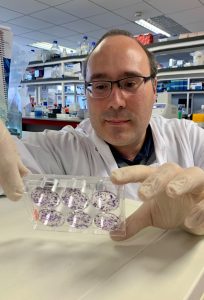GOLD-DRUG IN OESOPHAGEAL CANCER

Dr Simone Marcone is a post-doctoral researcher working in the lab of Prof Jacintha O’Sullivan
Simone describes his work here.
My major research interest involves the discovery and development of new drugs and clinical therapies to treat cancer in a more effective way. I am currently working in the Trinity St. James’s Cancer Institute (in Trinity College Dublin and St. James’s Hospital) in the gastrointestinal cancer research group in collaboration with clinical and surgical colleagues. My research project focuses on oesophageal cancer, a cancer of the foodpipe with low survival rates and a very poor response to treatment. Chemotherapy in combination with radiotherapy is usually used to kill the cancer cells followed by surgery, however, the majority of patients (70%) do not respond to this treatment. My studies are focused on improving the response of patients with oesophageal cancer to the radiotherapy by using a new drug combination that has been created in our laboratory. We discovered a novel drug called Pyrazinib that can increase the response to radiotherapy in cancer cells that are usually not responding to this treatment. We have packed pyrazinib with tiny gold particles as this combination will help the drug to reach the tumour and increase the response to radiotherapy. I will study how good this new combination drug will be at killing resistant cancer cell when treated with radiotherapy by using oesophageal cells in the lab, tumour samples from patients, and in mice. The development of new drugs that make tumours responding better to treatments will benefit patient care, resulting in better outcomes for these cancer patients with a poor prognosis. I really believe that research is our top priority to discover new strategies for treating cancer. One of the things I’m passionate about cancer research is the opportunity to help to find a cure giving hope to people with cancer.
My research aims to develop new drugs for a more effective treatment of those cancers that do not respond to therapy. Our lab developed a new drug packed with tiny gold particles which has the potential to improve response to radiotherapy, a “breakthrough” which pave the way for important advancement in cancer treatment.
Publications
Back









 Contact
Contact